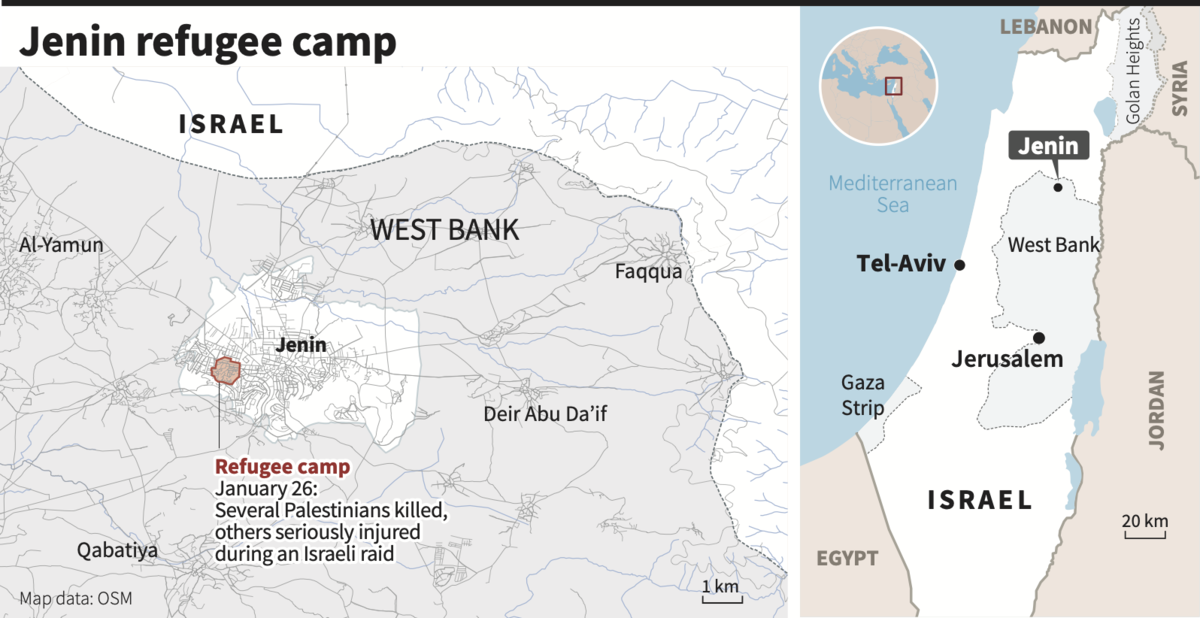Israeli Military Operation in Jenin Refugee Camp
Why In News?
Recently, Israel launched a military operation in the Jenin Refugee Camp in the occupied West Bank, resembling wide-scale operations carried out during the second Palestinian uprising (2000-2005).
- The operation aimed to destroy and confiscate weapons and targeted specific militant groups. It involved around 2,000 soldiers and utilized military drones for strikes.
- The Jenin camp has historically been a stronghold for armed struggle against Israeli occupation and a focal point for violence.
What are the Key Points related to Jenin Refugee Camp?
- Jenin Refugee Camp is a Palestinian refugee camp located in the northern West Bank, specifically in the city of Jenin.
- Established in 1953, the camp was created to accommodate Palestinian refugees who were displaced during the 1948 Arab Israeli war, also known as the Nakba ("catastrophe" in Arabic).
- The camp has also been a site of frequent clashes between Palestinian militants and Israeli forces over the years.
- It gained particular attention during the second Palestinian uprising, also known as the Al-Aqsa Intifada (2000-2005), when it became a stronghold for armed resistance against Israeli occupation.
- Jenin Refugee Camp remains a symbol of the Palestinian refugee issue and the ongoing Israeli-Palestinian conflict.
What are the Other Important Places Linked to Israel Palestine Conflict?
- Al Aqsa Mosque:
- It is one of the holiest structures in the Islamic faith known by Muslims as Haram al-Sharif, or the Noble Sanctuary, and by Jews as the Temple Mount.
- The site is part of the Old City of Jerusalem, sacred to Christians, Jews and Muslims.
- Sheikh Jarrah:
- Sheikh Jarrah is a neighborhood located north of the Old City in East Jerusalem.
- Hundreds of thousands of Palestinians were forced out of their homes when the State of Israel was created in historical Palestine in 1948.
- Twenty-eight of those Palestinian families moved to Sheikh Jarrah in East Jerusalem to settle there.
- Sheikh Jarrah is a neighborhood located north of the Old City in East Jerusalem.
- West Bank:
- West Bank is a landlocked territory in West Asia. It also contains a significant section of the western Dead Sea.
- It was captured by Jordan after the Arab-Israeli War (1948) but Israel snatched it back during the Six-Day War of 1967 and has occupied it ever since.
- The West Bank is sandwiched between Israel and Jordan.
- Gaza Strip:
- The Gaza Strip is located between Israel and Egypt. Israel occupied the strip after 1967, but relinquished control of Gaza City and day-to-day administration in most of the territory during the Oslo peace process.
- In 2005, Israel unilaterally removed Jewish settlements from the territory, though it continues to control international access to it.
- Golan Heights:
- The Golan Heights is a strategic plateau that Israel captured from Syria in the 1967 war. Israel effectively annexed the territory in 1981.
- In 2017, the USA officially recognized Jerusalem and Golan Heights a part of Israel.
UPSC Civil Services Examination Previous Year Question (PYQ):
Q1. Consider the following statements: (2023)
Statement-I: Israel has established diplomatic relations with some Arab States.
Statement-II: The ‘Arab Peace Initiative’ mediated by Saudi Arabia was signed by Israel and Arab League.
Which one of the following is correct in respect of the above statements?
(a) Both Statement-I and Statement-II are correct, and Statement-II is the correct explanation for Statement-I
(b) Both Statement-I and Statement-II are correct, and Statement-II is not the correct explanation for Statement-I
(c) Statement-I is correct, but Statement-II is incorrect
(d) Statement-I is incorrect, but Statement-II is correct
Ans: (c)
Q2. The term “two-state solution” is sometimes mentioned in the news in the context of the affairs of (2018)
(a) China
(b) Israel
(c) Iraq
(d) Yemen
Ans: (b)
Q3. Yom Kippur War was fought between which sides/countries? (2008)
(a) Turkey and Greece
(b) Serbs and Croats
(c) Israel, and Arab countries led by Egypt and Syria
(d) Iran and Iraq
Ans: (c)
